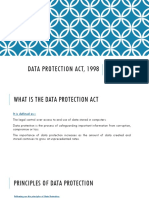0% found this document useful (0 votes)
25 views1 page2
Data privacy involves the responsible handling of personal information to protect individual rights, with key principles including consent, data minimization, and accountability. Important legislation such as GDPR and CCPA aims to safeguard data rights, while organizations must adopt data governance frameworks and security measures to prevent breaches. Compliance with data privacy laws is essential not only to avoid fines but also to build trust with customers and stakeholders.
Uploaded by
dilhanmacysCopyright
© © All Rights Reserved
We take content rights seriously. If you suspect this is your content, claim it here.
Available Formats
Download as DOCX, PDF, TXT or read online on Scribd
0% found this document useful (0 votes)
25 views1 page2
Data privacy involves the responsible handling of personal information to protect individual rights, with key principles including consent, data minimization, and accountability. Important legislation such as GDPR and CCPA aims to safeguard data rights, while organizations must adopt data governance frameworks and security measures to prevent breaches. Compliance with data privacy laws is essential not only to avoid fines but also to build trust with customers and stakeholders.
Uploaded by
dilhanmacysCopyright
© © All Rights Reserved
We take content rights seriously. If you suspect this is your content, claim it here.
Available Formats
Download as DOCX, PDF, TXT or read online on Scribd
/ 1








































































